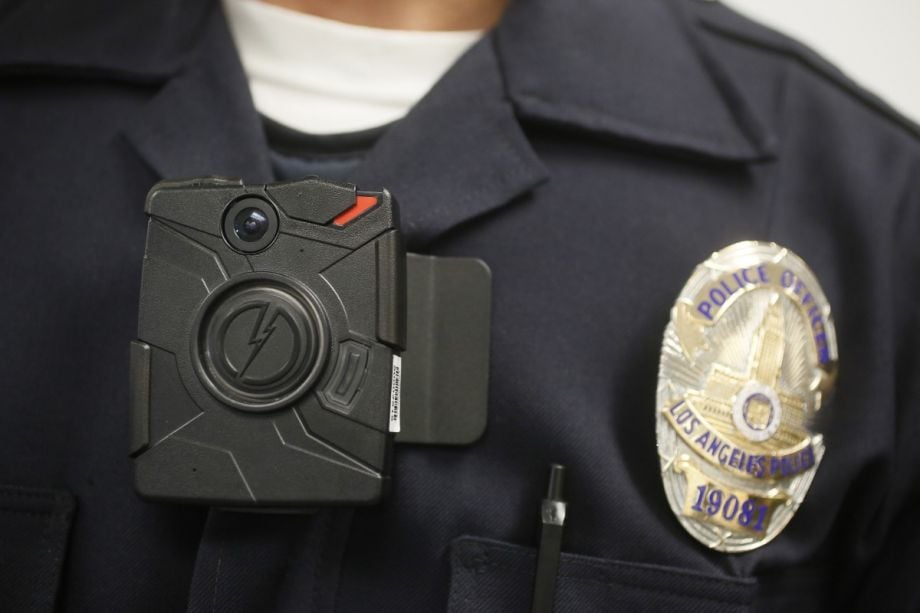
An L.A. police officer wears a body camera during a demonstration. (AP Photo/Damian Dovarganes, File)
Before the NYPD expands its body camera pilot program from 60 officers in five high-crime precincts to more than 1,000 in 20 precincts across the city, they’re seeking the public’s input on the program’s guidelines, reports Sheepshead Bites.
The department has released a survey — open to NYC residents and non-residents alike — asking people to weigh in on a slate of still-unresolved issues around body cameras, which some police reformers believe could contribute to increased police transparency. The survey includes questions about when officers should be required to record, whether they should inform the public when recording, who should be able to view the footage, and whether respondents believe the use of body cameras would improve or worsen public safety and public trust.
The NYPD’s Body Worn Camera pilot program launched in September 2014, with just 54 cameras. Last year it was the subject of a report by the Department of Investigation, which included policy changes to be implemented before the program expands. The report recommended that the NYPD broaden the number of situations in which body cameras must be activated, while also creating stricter limitations around recording vulnerable populations. It also suggested the department create a system for periodic review of footage by supervisors and prohibit officers who are a subject or a witness in an investigation from viewing footage before providing an official statement.
According to a fact sheet released by the NYPD and the Policing Project at NYU School of Law, under the proposed expansion, officers would be required to record any use of force; all arrests, summonses and searches; when responding to a crime in process; when patrolling a New York Housing Authority building or a building enrolled in the Trespass Affidavit Program; when transporting anyone in police custody to a police station; or when interacting with someone experiencing an emotional disturbance. They will be prohibited from filming internal police matters, sensitive police-citizen encounters like a strip search, inside courthouses or medical facilities, and at public protests.
Officers would be encouraged but not required to tell the public when they’re being recorded, but they don’t need permission to record. A member of the public can ask an officer to turn their camera off, but it would be at the officer’s discretion to comply. The NYPD would be required to keep all video recordings for a minimum of six months, with specific timelines for specific types of cases.
The proposed policy makes one major break from the Department of Investigation’s recommendations. Under the expanded pilot, officers would be allowed to view video before making a sworn statement if they’ve been involved in a significant use of force, with supervisor approval. Members of the public would be able to request footage under the Freedom of Information law. The NYPD, with the attorney general and district attorney, would have discretion when it comes to making videos of high-profile incidents — like officer-involved shootings — available to the public.
Police shootings of unarmed civilians have fueled the call for police departments to adopt body cameras. NYPD’s expansion of their program coincides with yet two more fatal shootings by police, of Alton Sterling in Baton Rouge, Louisiana, and Philando Castile in St. Paul, Minnesota, which have spurred nationwide protests against the use of lethal force against African-Americans. Both officers involved in Alton Sterling’s shooting were wearing body cameras, but neither recorded the incident. The Baton Rouge police chief has said both cameras fell off. The Seattle Times reports that half of big city police departments now use body cameras, and the Department of Justice has released guidelines for departments looking to implement them. With the expansion, NYC’s program will become one of the largest in the country.
The NYPD’s body camera survey is open until July 31.